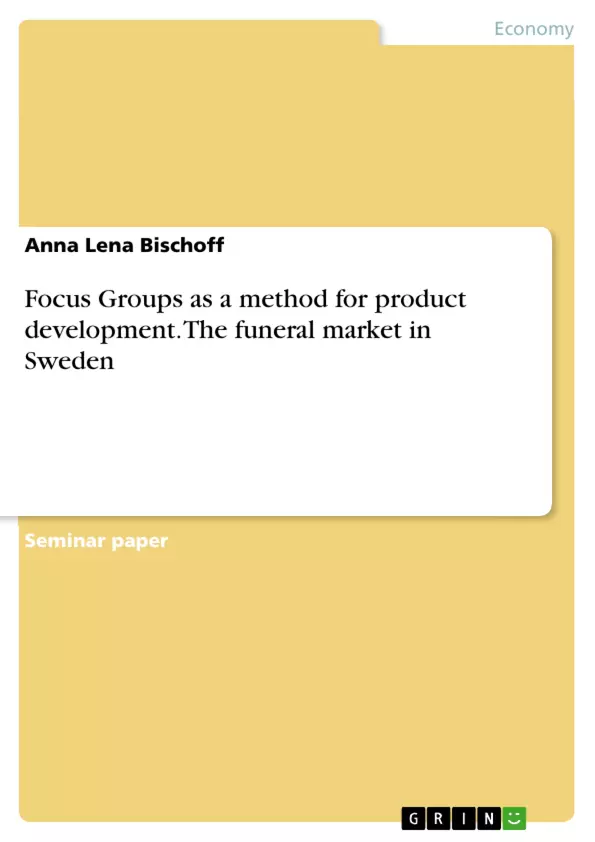This report is about the business methods. The report is based on the achievements acquired in the last modules. Suitable methods are needed in the business module to help the team move forward in their product development process.
Currently, the team has developed several concepts with different connection types and design styles. However, the team has no idea whether others will like this product. Without such awareness, the team would be blind to see the potential risks and shortages in the project. Thus one method is introduced to make the team aware of how potential clients or companies think about this product. The method described is a focus group. It is introduced in more detail in this paper to discuss the advantages and few disadvantages it contains.
In a focus group different target customers are gathered to discuss their views about the product’s materials, the designs and whether they would purchase this product or not. If they are not interested in buying the product it is of value for the team to know, what influenced their decisions. Since this is a very special product, not only the views of potential customers are of interest, but also the knowledge and experience of experts, such as funeral companies. Therefore an interview was conducted with a funeral company to validate customer opinions.
Inhaltsverzeichnis (Table of Contents)
- Introduction
- Background case company
- Results from module 2-design and module 3-engineering
- Theoretical framework for business methods
- Procedure when conducting a focus group
- Advantages and disadvantages of focus groups
- Empirical data collection
- Secondary research
- The funeral market
- The funeral market in Sweden
- Focus groups
- Interview with funeral home
- Secondary research
- Conclusion
Zielsetzung und Themenschwerpunkte (Objectives and Key Themes)
This report aims to explore the use of business methods in product development, focusing on the development of innovative, sustainable funeral solutions. It examines the application of focus groups and interviews to gain valuable insights from potential customers and industry experts regarding the acceptability and potential market for a fiberboard coffin.
- Business method application in product development
- Focus group methodology and its advantages and disadvantages
- The funeral market and its evolving demands
- Sustainability and innovation in the funeral industry
- Consumer perception and acceptance of new funeral products
Zusammenfassung der Kapitel (Chapter Summaries)
- Introduction: This chapter introduces the report's focus on business methods and their role in product development. It describes the background of the case company, a papermill seeking to develop a new business idea, and outlines the development process leading to the concept of fiberboard coffins.
- Theoretical framework for business methods: This chapter explores the theoretical framework of focus groups, outlining their procedures, advantages, and disadvantages. It discusses the importance of participant selection, moderator role, and the role of group dynamics in eliciting diverse opinions.
- Empirical data collection: This chapter details the methodology employed in the research, including secondary research on the funeral market, the use of focus groups to collect data on consumer opinions, and an interview with a funeral home to gain expert insights. It also explores the specific challenges and considerations for conducting research in the funeral industry.
Schlüsselwörter (Keywords)
This report focuses on the application of business methods, particularly focus groups and interviews, to explore the potential market for innovative funeral solutions. It examines the evolving funeral market, consumer preferences, and the role of sustainability and innovation in the industry. Key themes include product development, market research, consumer behavior, and the impact of innovative products on traditional practices.
Frequently Asked Questions
How can focus groups assist in product development?
Focus groups allow teams to gather diverse opinions from potential customers about designs, materials, and purchasing intent, helping to identify risks and market potential.
What is the specific product being developed in this Swedish case study?
The case study focuses on the development and market acceptance of innovative, sustainable fiberboard coffins.
What are the advantages of using focus groups?
They provide deep insights into consumer motivations, allow for group dynamics to spark new ideas, and help validate product concepts before full market entry.
Why was an interview with a funeral home conducted?
Since the funeral market is specialized, expert knowledge from industry professionals (like funeral directors) is needed to validate consumer data and understand market constraints.
What characterizes the funeral market in Sweden according to the report?
The report explores the evolving demands of the Swedish funeral market, particularly the shift toward sustainability and innovative solutions.
What are the potential drawbacks of focus groups?
Drawbacks include the risk of "groupthink," where individuals follow the majority opinion, and the challenges of selecting a truly representative participant group.
- Quote paper
- Anna Lena Bischoff (Author), 2016, Focus Groups as a method for product development. The funeral market in Sweden, Munich, GRIN Verlag, https://www.grin.com/document/316999



